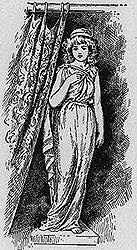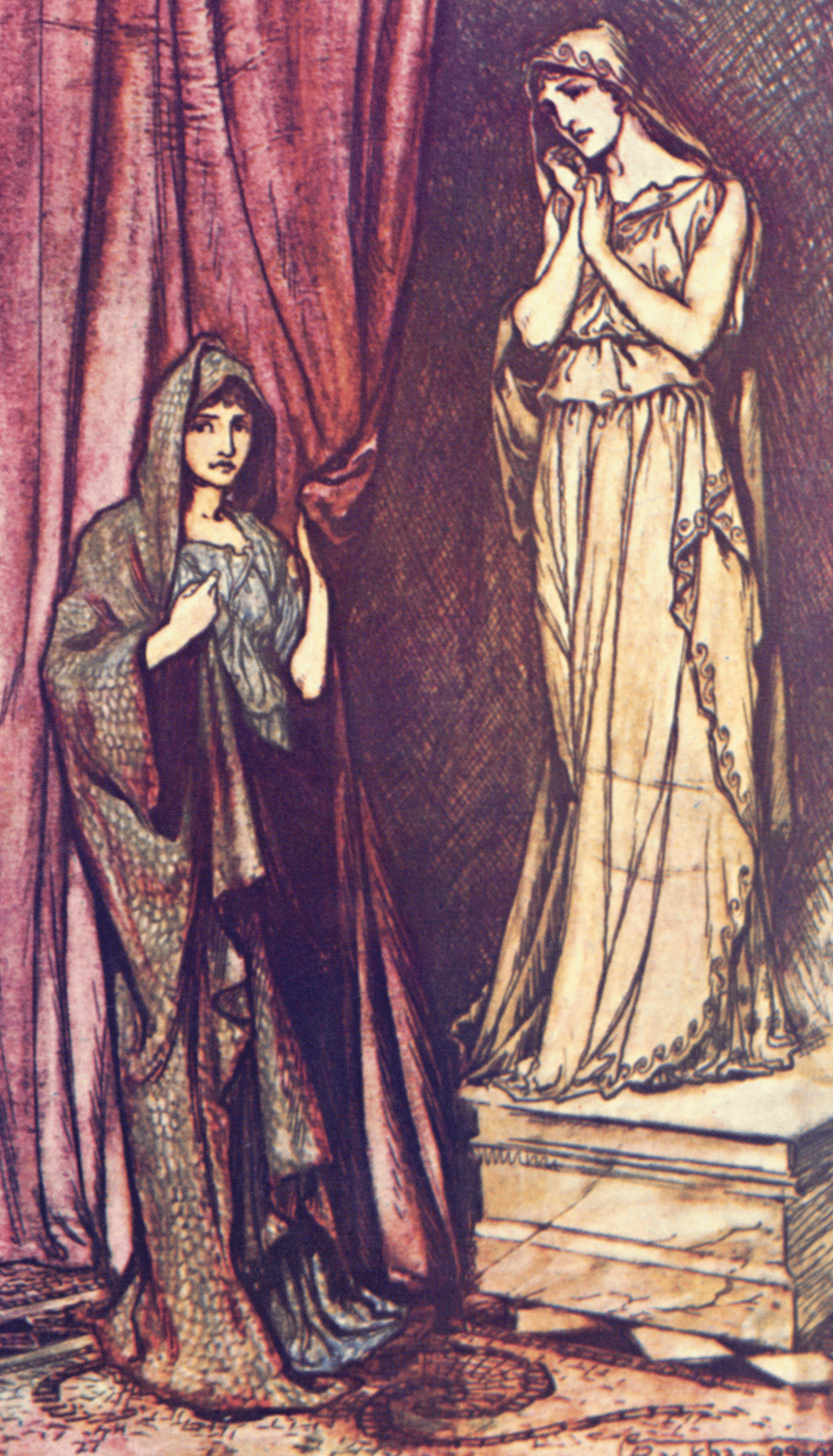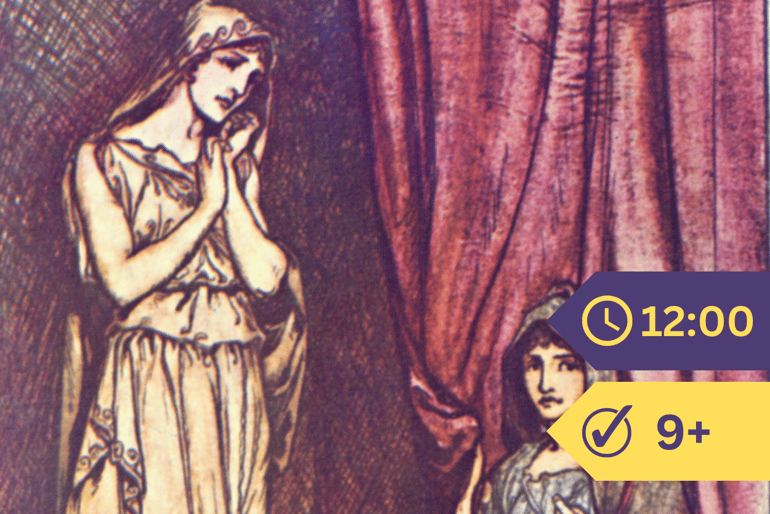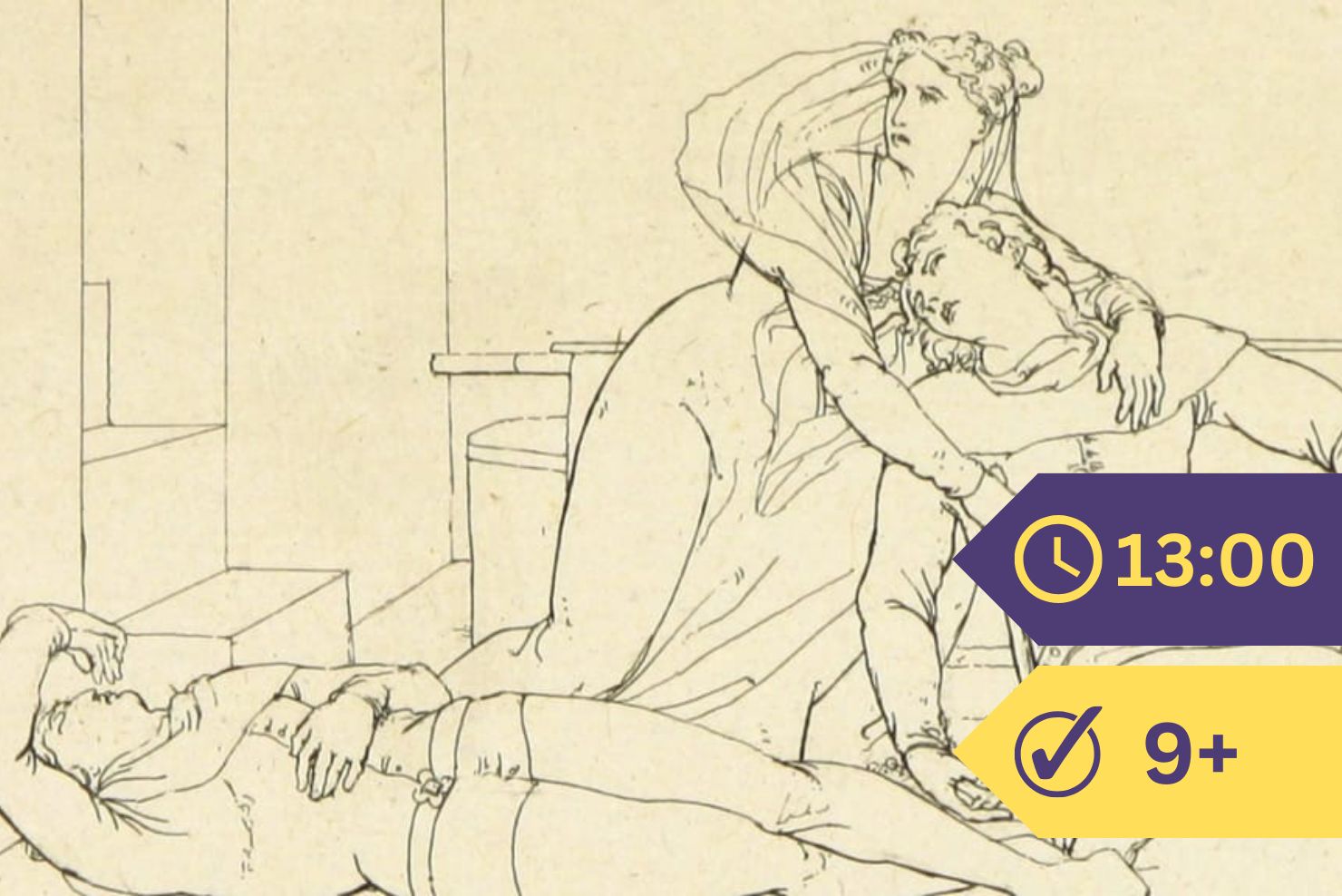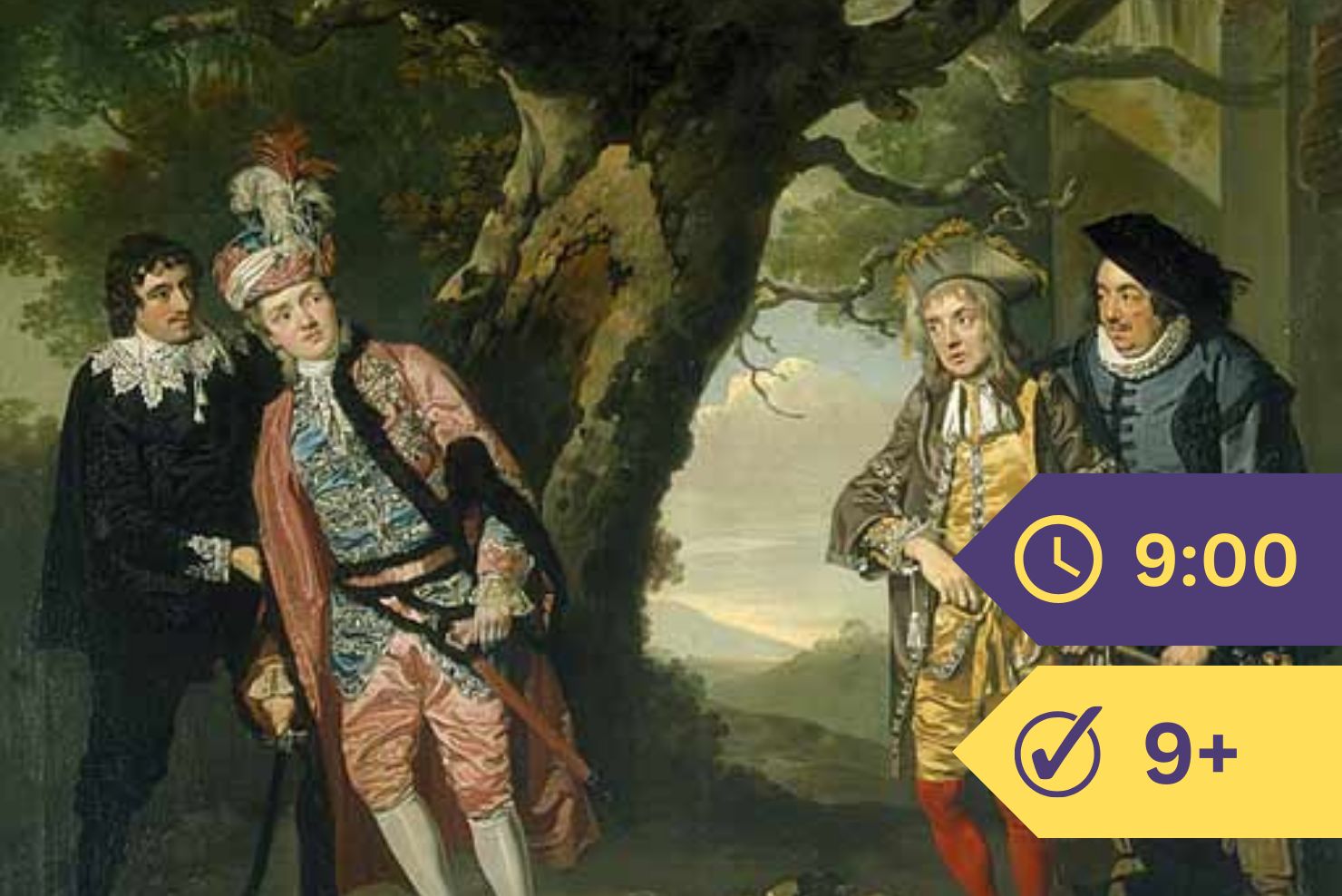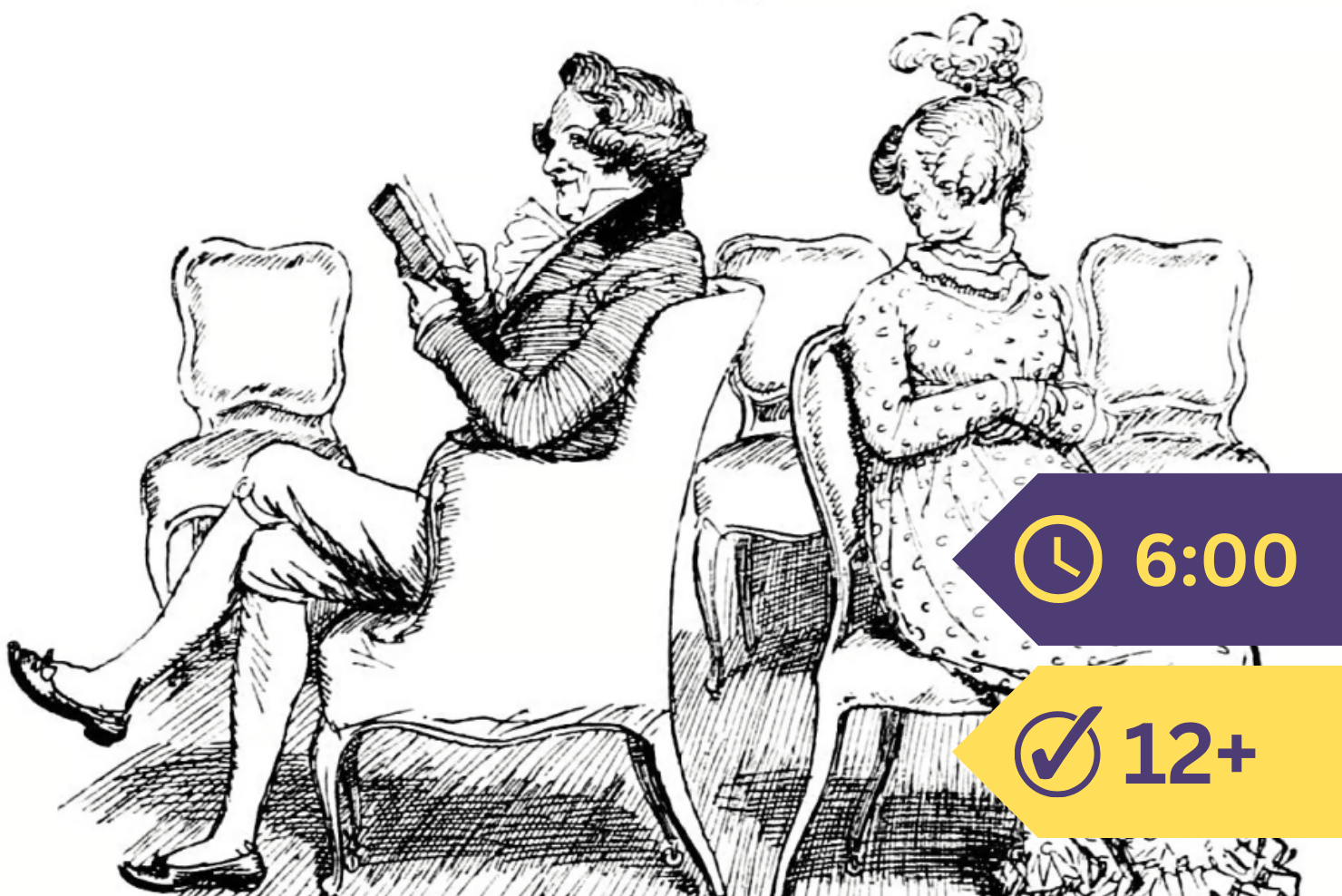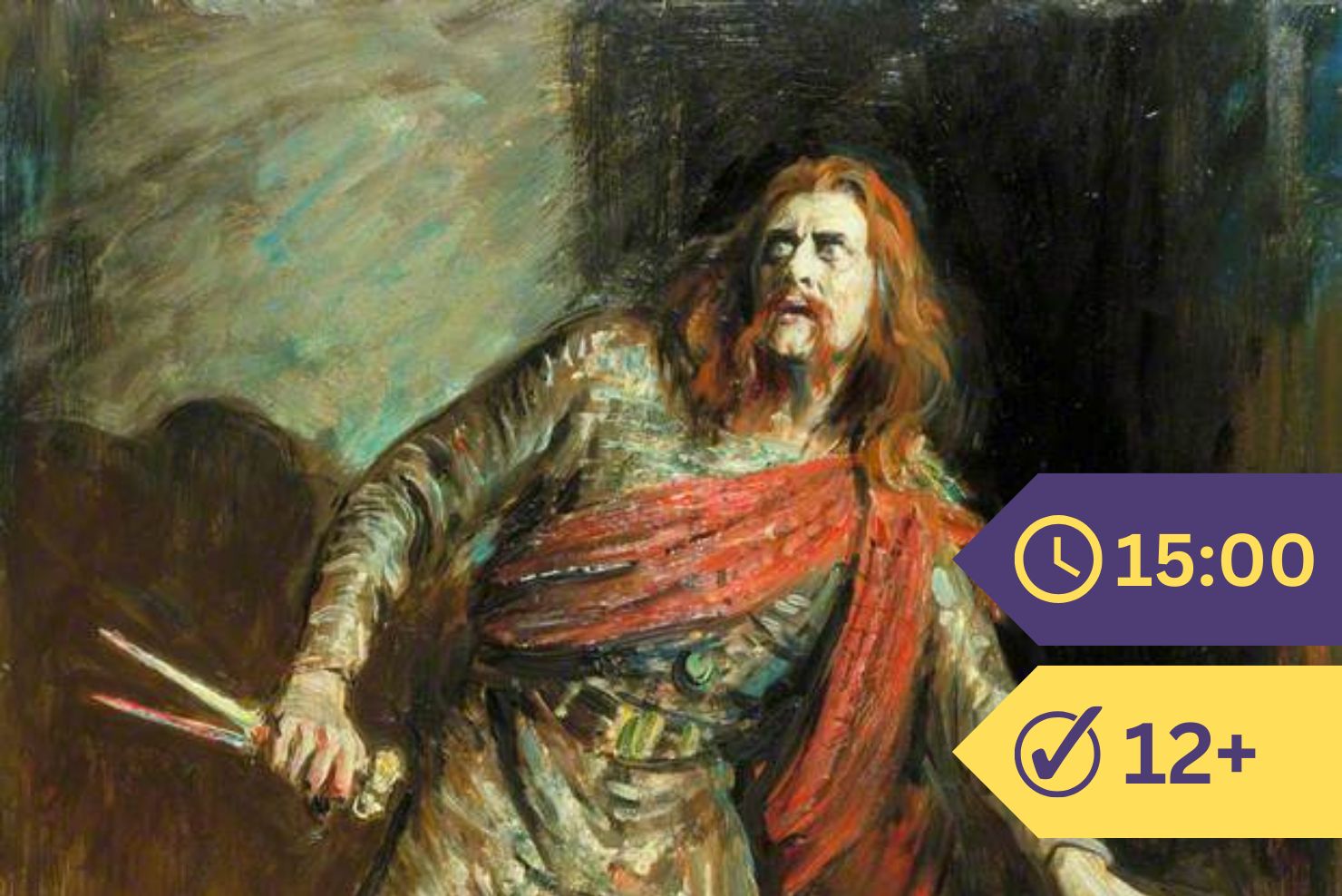Leontes was the king of Sicily and his best friend was Polixenes, the king of Bohemia. They were raised together and only separated when they each had to rule their kingdom. Many years later, when they were both married and had a son, Polixenes came to stay with Leontes in Sicily.
Leontes was a violent and hot-headed man. He was also foolish because he believed that his wife Hermione loved Polixenes more than him. Once he had this idea, he could think of nothing else. He ordered his loyal servant Camillo to put poison in Polixenes’ wine. Camillo tried to dissuade him from this evil deed, but when he realized that nothing helped, he pretended to agree with the idea. Then he told Polixenes what Leontes was planning, and they fled that night and returned to Bohemia where Camillo became Polixenes’ advisor and friend.
Leontes threw Queen Hermione into prison, and her son, the heir to the throne, died of sorrow when he had to watch his mother being treated cruelly and unfairly.
While the queen was in prison, she gave birth to a daughter. Her friend Paulina dressed the baby neatly and took her to show the king, hoping that the sight of this helpless child would soften his heart towards the dear queen who had never harmed him and loved him more than he deserved. But the king wouldn’t even look at the baby and ordered Paulina’s husband to take the baby on a ship to the most desert and terrible place he could find. Paulina’s husband had to carry out this order although it was very much against his will.
Then it was time to try the poor queen for her treason, that she had chosen Polixenes over her king. But she had never thought of anyone else but her husband. Leontes had sent messengers to the god Apollo to ask if his cruel thoughts about the queen were true. However, he had no patience to wait until they returned, and so it happened that they arrived in the middle of the trial. The oracle said:
“Hermione is innocent, Polixenes is blameless, Camillo is an honest subject, Leontes is a jealous tyrant, and the king will live without an heir, all that is lost is not found.”
Then a man came and told the queen that the little princess was dead. This was not true, but when the poor queen heard this, she fainted. And then the king realized how bad he had been. He ordered Paulina and the ladies to take the queen away and try to revive her. But Paulina came back and told the king that Queen Hermione was also dead.
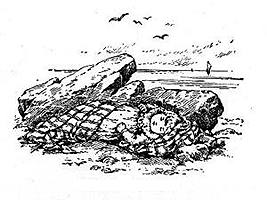
Now Leontes finally saw his own foolishness. His queen was dead, and the little daughter who could have been a comfort to him, he had sent away to become prey to wolves and other wild animals. Life had nothing more to offer him. He gave himself over to his grief and spent many sad years in prayer and regret.
The baby princess was left on the shore of Bohemia, the kingdom where Polixenes reigned. Paulina’s husband never came home to tell Leontes where he had left the baby. When he went back to the ship, he met a bear and was torn to pieces. And that was his end.
But the poor abandoned baby was found by a shepherd. The baby was dressed in rich clothes and there were a few jewels with her. And there was a paper pinned to her jacket, which said her name was Perdita and that she had noble parents.
The kind-hearted shepherd took the baby and, together with his wife, raised her as if she were their own child. She received no more education than the average shepherd child, but she possessed the grace and charm of her royal mother, which made her very different from the other girls in the village.
One day, Prince Florizel, the son of the King of Bohemia, was near the shepherd’s house and saw Perdita. She had grown into a beautiful young woman. Florizel befriended the shepherd, but did not reveal that he was a prince. He said that his name was Doricles and that he worked for a lord. He became deeply in love with Perdita and visited her almost daily.
The King of Bohemia could not understand what his son was doing every day, so he had him followed and discovered that his heir was in love with the beautiful shepherdess Perdita. Polixenes, who wanted to see if the story was true, went with the faithful Camillo to the shepherd’s house. They disguised themselves and were warmly welcomed to the sheep-shearing feast.
Florizel and Perdita did not take part in the feast, but sat quietly talking with each other. The king noticed the charming manners and great beauty of Perdita, but he did not suspect that she was the daughter of his old friend Leontes. He said to Camillo:
“This is the loveliest girl that ever ran on the green grass. But nothing she does seems to belong here. She belongs to something that is greater than herself, she is too noble for this place.”
But when Florizel, who did not recognize his father, asked the strangers to witness his engagement to the beautiful shepherdess, the king revealed himself. He forbade the marriage and threatened to imprison her and her old father if she ever saw Florizel again. Then the king left, but Camillo stayed. He was greatly charmed by Perdita and wanted to befriend her.
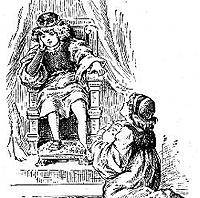
Camillo had long known how much regret Leontes had for his foolish madness, and he longed to go back to Sicily to see his old master. He suggested that the young people go there and claim the protection of Leontes. They did, along with the shepherd, and they took Perdita’s jewels, her baby clothes, and the paper that was attached to her jacket.
Leontes received them with great kindness. He was very polite to Prince Florizel, but all his eyes were fixed on Perdita. He saw how much she looked like Queen Hermione and said over and over again:
“Such a sweet creature could have been my daughter if I had not cruelly sent her away.”
When the old shepherd heard that the king had lost a little daughter, left on the coast of Bohemia, he was sure that Perdita, the child he had raised, must be the princess. When he told his story and showed the jewels and the paper, the king realized that Perdita was indeed his long-lost child. He welcomed her with joy and rewarded the good shepherd.
Polixenes had driven his son away to prevent the marriage to Perdita, but when he discovered that she was the daughter of his old friend, he gladly gave his consent.
Yet Leontes could not be happy. He remembered how his beautiful queen, who should have stood by his side to share his joy, had died because of his own foolishness. He prayed for forgiveness for his bad deeds and was grateful for the goodness of the shepherd.
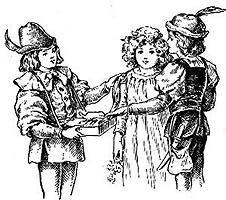
Then Paulina, who had been highly favored by the king for her kindness to the dead Queen Hermione, said, “I have made a statue that looks exactly like the dead Queen. I keep it in a separate house, and since you lost the Queen, I have gone there two or three times a day. Would you like to see it, Majesty?”
So Leontes and Polixenes, and Florizel and Perdita, went with Camillo to Paulina’s house, where a heavy purple curtain shielded a niche. Paulina, with her hand on the curtain, said, “She was incomparably beautiful when she was alive, but I believe that her dead likeness surpasses everything you have seen so far or that any human being has ever made. Look and speak.”
With that, she pulled away the curtain and showed them the statue. The king stared and stared at the beautiful statue of his dead wife, but said nothing.
“I appreciate your silence,” said Paulina, “the more admiration I have. But speak, isn’t it just like her?”
“It is almost herself,” said the king, “and yet, Paulina, Hermione was not as wrinkled, not as old as this statue seems.”
“Ah,” said Paulina, “that is the cunning of the sculptor, who shows her to us as she would have been if she had lived until now.”
And still Leontes looked at the statue and could not take his eyes off it.
“If I had known,” said Paulina, “that this statue would have aroused your grief and love so much, I would not have shown it to you.”
But he only replied, “Do not close the curtain.”
“No, you should not look any longer,” said Paulina, “otherwise you will think it moves.”
“Leave it open! Leave the curtain open,” said the king. “Wouldn’t you think it was breathing?”
“I will draw the curtain now,” said Paulina, “otherwise you will think it is really alive.”
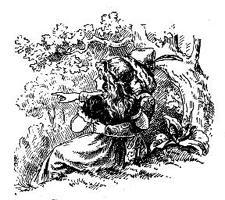
“Ah, dear Paulina,” said Leontes, “let me think of twenty years together.”
“If you can bear it,” said Paulina, “I can make the statue move, I can bring it down and it can take you by the hand. Only you would think it was evil magic.”
“Whatever you can make her do, I like to watch,” said the king.
While all the people watched in admiration, the statue moved from its pedestal, came down the stairs, and wrapped its arms around the king’s neck. He held her face and kissed her many times because this was not a statue but the real living Queen Hermione herself. She had hidden for all those years and had been cared for by the good Paulina. She did not want to reveal herself to her husband, although she knew he had regretted his actions. She could not forgive him completely until she knew what had happened to her baby.
Now that Perdita had been found, she forgave her husband everything, and it was like a new and beautiful marriage for them, to be together again.
Florizel and Perdita got married and lived happily ever after.
For Leontes, his many years of suffering had been worth it when he, after long sorrow and much pain, felt the arms of his true love around him again.
